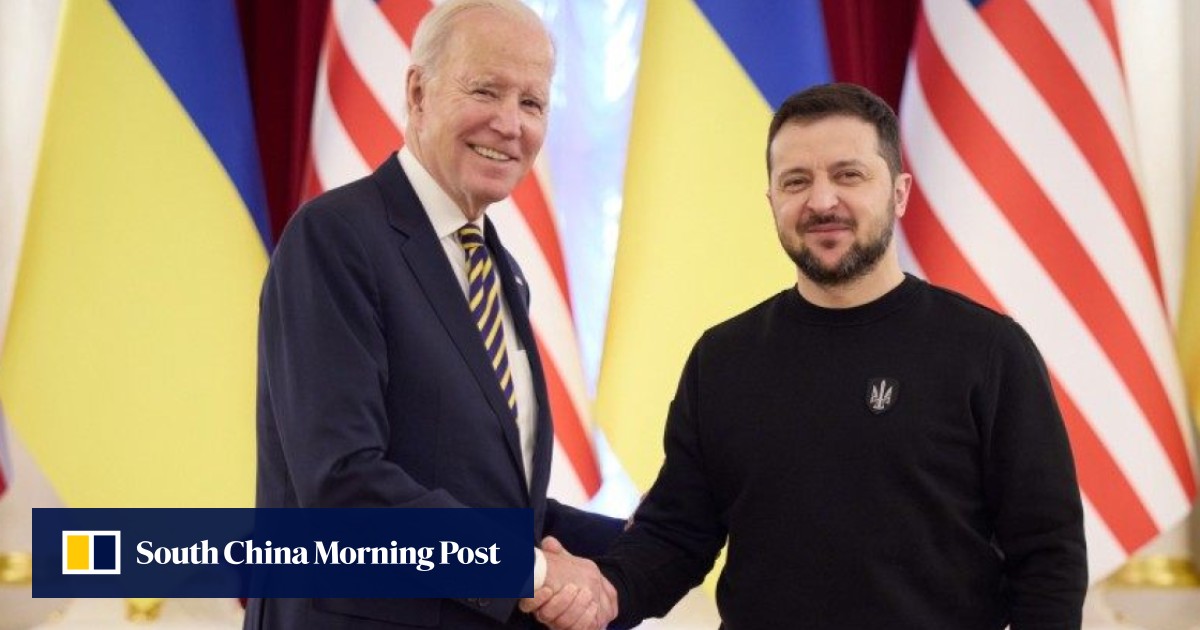Policymakers in Kyiv are trying to work out how they can fund Ukraine’s war effort if its allies fail to come through with promised aid. The options are fraught with risk.
The financial toolkit includes raising tax revenue, an obvious challenge in a battered economy, or cutting spending for an already beleaguered public. Monetary-policy options are devaluing the Ukrainian currency or returning to the central bank’s taps, a move Finance Minister Serhiy Marchenko told Bloomberg would have “negative consequences.”
President Volodymyr Zelensky is in Washington to make an urgent appeal to US Congressional Republicans who are holding up more than US$60 billion proposed by President Joe Biden. The European Union’s €50 billion (US$53.9 billion) package meanwhile is being blocked by Hungarian Prime Minister Viktor Orban as part of a broader fight over the bloc’s budget.
Blinken, in Kyiv, unveils US$2B in military aid, Zelensky says towns recaptured
Blinken, in Kyiv, unveils US$2B in military aid, Zelensky says towns recaptured
At stake is Ukraine’s financial lifeline after Kyiv’s counteroffensive failed to deliver gains and the second full winter since the Russian invasion brings new hardships. Zelensky’s chief of staff, who met US officials last week, said a halt to financing raises the spectre of handing Vladimir Putin a victory that would change the map of Europe.
On Monday, Moscow said it will “very attentively” watch the Zelensky-Biden meeting.
Kremlin spokesman Dmitry Peskov said that “tens of billions of dollars” already provided by Washington to Kyiv had failed to turn the tide of war and further aid would similarly fail to do so, adding that Zelensky’s authority was being undermined by the failures.
“The support from the EU and US is crucial,” Marchenko told Bloomberg last week. “Ukraine is maintaining active communication with the representatives of the EU and US, informing them about our needs for the next budget year.”
If the shortage of foreign aid inflows becomes larger than several billion US dollars, the authorities will only have unpleasant options to choose from
Kyiv plans to cover its budget deficit, amounting to around one-fifth of economic output, primarily with more than US$40 billion in external financing next year. The Ukrainian finance chief said last month that more than two-thirds of that funding hadn’t yet been confirmed.
“If the shortage of foreign aid inflows becomes larger than several billion US dollars, the authorities will only have unpleasant options to choose from,” said Olena Bilan, chief economist at Kyiv-based investment bank Dragon Capital.
The Finance Ministry has been leaning on the National Bank of Ukraine to devalue the hryvnia, a move that stands to bolster tax revenue with sources such as higher customs levies.
Even after the central bank announced a more flexible managed exchange rate in October – partially unwinding capital controls imposed at the beginning of the war – monetary policymakers have kept the hryvnia rate flat against the US dollar with market interventions.
That’s put pressure on next year’s budget, since the ministry priced in a devaluation to an average hryvnia exchange rate at 40.7 to the dollar, stronger than the initial forecast of 41.4. But the Ukrainian currency has remained in a corridor, trading close to 37 since the loosening was announced.
Another monetary option is tried and tested: printing money. Last year the NBU issued almost 400 billion hryvnia (US$10.9 billion) through purchases of government-issued bonds, mostly in the first months of the war, plugging monthly gaps before international donors created a steady flow of funding.
But monetary financing was unpopular among central bank officials, who warned about its sustainability. The advantage of having additional financial bandwidth is dimmed by the pressure on the Ukrainian currency with a flood of hryvnia, which last year helped fuel inflation.
The International Monetary Fund (IMF), which is set to disburse US$5.3 billion in loans next year, set limits to the practice as part of its conditions: in case of an external funding shortfall, Kyiv pledged to limit monetary financing to about 50 billion hryvnia per quarter after reaching a ceiling on market borrowing, according to the IMF.

But the flagging support – and the shifted focus to the Israel-Hamas conflict – has become a sobering reality in Ukraine. Newly-committed aid to Ukraine dropped to the lowest level since Russia invaded in February 2022 – down almost 90 per cent between August and October from the year-ago period to €2.11 billion, according to data tracked by the Kiel Institute for the World Economy released Thursday.
“Our figures confirm the impression of a more hesitant donor attitude in recent months,” Christoph Trebesch, head of the team in charge of the Ukraine Support Tracker and director of a research centre at the Kiel Institute, said in a statement.
‘Culture of dishonest reporting’ means Russia unaware of Ukraine death toll: UK
‘Culture of dishonest reporting’ means Russia unaware of Ukraine death toll: UK
That hesitancy is on full display in the US, where Biden accused Republicans of “playing chicken with our national security” after their lawmakers – many of whom still support Kyiv’s war aims – blocked funding legislation because it didn’t do enough to protect the US southern border.
The Ukrainian leader is scheduled to make an in-person address to a meeting of US Senators early Tuesday, according to a Senate leadership aide. The House speaker, Republican Mike Johnson, will also meet the Ukrainian president.
“Let me be frank with you, friends – if there’s anyone inspired by unresolved issues on Capitol Hill, it’s just Putin and his sick clique,” Zelensky told the National Defense University on Monday, speaking alongside Defence Secretary Lloyd Austin. “When the free world hesitates, that’s when dictatorships celebrate.”
Additional reporting by Reuters

